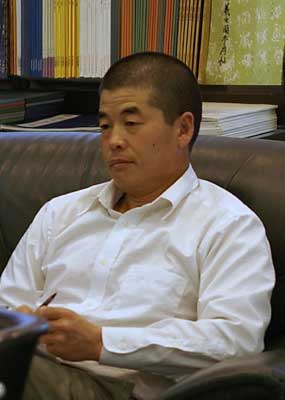Profiles
Snapper focuses on improving the world
By Zhou Wenting (China Daily)
Updated: 2010-10-12 07:30
 |
Large Medium Small |
BEIJING - Wang Bo is making the world a better place one snapshot at a time.
The volunteer photographer records the poverty faced by children in rural areas. He then exhibits his work to raise awareness - and hopefully find donors - to help the youngsters overcome their challenges.
 Wang Bo is a farmer-turned photographer from Northwest China’s Gansu province.?? |
That was the year Wang met a little girl from his neighboring village.
She was suffering from leukemia and was kneeling on the street begging for assistance for medical treatment.
Though he knew the family and wanted to help, he didn't have enough money to support her.
She died a few months later.
"It was really sad," Wang recalled. "I just couldn't get it out of my mind."
He then turned his attention to children from poverty-stricken families, predominantly in the country's remote rural areas.
Wang, once a farmer in Northwest China's Gansu province who finished his own schooling at the age of 14, has come to believe that education is the fundamental way to relieve poverty - and that was how his project, Love Wang Bo's Plan, was born.
Through his lens, Wang documents the dilemmas faced by students and teachers. Those who view his work can then choose who they would like to subsidize.
"The government has made great efforts to provide education in the country's less developed central and western areas," Wang said, referring to China's active efforts to hire teachers in rural areas and the introduction of free compulsory education across the country in 2006.
"But reality tends to fall short of expectations," Wang said.
The number of qualified teachers in remote areas is still far from enough, he said in Beijing during the recent launch of his first book A Hope Never Given Up, Substitute Teachers in West China Through My Lens.
In reality, these substitute teachers, as they are known, are mostly senior high school graduates who didn't get into college. Some of them only have junior high school educations.
They are often the only teaching staff available in poverty-stricken areas. For this, they receive a meager salary of several hundred yuan a year, Wang said.
"One purpose in publishing the book is to let volunteers with good qualifications offer a helping hand," Wang said. "Another is to make substitute teachers a formal occupation."
Students who are unable to complete their high school educations due to poverty are now Wang's main concern.
It takes at least 60,000 to 70,000 yuan ($9,000 to 10,500) to complete a senior high school and college education, which is out of the reach of most peasant families. So they either give up the opportunity or take out big loans, he said.
Some graduate from college and fail to find jobs.
"I've seen little kids told by their parents not to follow in the footsteps of their elders, who spent heavily to get a college education and then remained in the village, unemployed," said Wang.
He is looking forward to seeing the introduction of a policy in which full or partial scholarships are available from the government for poverty-stricken rural senior high students with excellent academic records.
"Very few students receive senior high school education in the countryside - less than one in 10 - and even fewer will survive the economic hardships. Scholarships can sweep away the heavy economic barrier for potential elites," Wang said.
Wang has personally racked up a debt of almost 70,000 yuan in the process of helping nearly 20,000 poverty-stricken students and rural substitute teachers from 10 provinces on the mainland obtain economic aid.
"The situation (of students dropping out of school due to poverty) has improved a lot thanks to the government's introduction of nine-year compulsory education across the nation," Wang said.
While lending a hand to poor children from the countryside, he has often been absent from his own son's life.
He spends one month each year with his family, mainly to recuperate from the heart disease and esophagitis aggravated by an irregular diet on the run.
Wang feels guilty to his family, especially his son.
"I missed the whole process of his growing up. I'm a totally strange father to him," Wang said, lowering his head.
Despite all the difficulties and illness along the way, Wang is still on the go.
After the catastrophic landslide on Aug 8 in Zhouqu of Gansu province, Wang collected 20,000 liters of mineral water and 1,000 packages of instant noodles for local victims.
"China needs the efforts of volunteers, who will give the world a more powerful spirit," he said. "The conviction never stops growing in my heart. It makes me stronger."